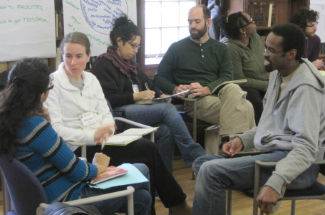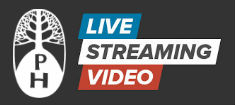Radical Faithfulness Program
An Intensive 9-Month Online/On-Campus Program
on Spiritual Activism and Faith-Based Organizing
(with five on-campus residencies)
From September 26, 2016 to May 22, 2017
Core Components of the Program
On-Campus Residencies:
Students in the program will come to Pendle Hill’s 23 acre campus five different times for four days each. This in-person portion of our Radical Faithfulness Program will be used to build deeper community and worship together; enjoy a time out from the pressures of our daily lives, take part in face-to-face workshops, talks, dialogs, simulations, exercises, art projects, walks, rituals, and community meetings to aid your learning; and eat great local farm-to-table food that has been lovingly and skillfully prepared. Students will also be prepared to take full advantage of the online modules and other essential components to this program.
Online Learning:
Before and after each on-campus residency, the students will be in their home communities, but study together via online discussions of required and supplemental readings; watching and responding to online audio and visual material chosen by the faculty or shared by other participants; sharing personal/spiritual/political stories; working in smaller collaborative mentorship groups; and planning and sharing information about their fieldwork projects and what they are “learning by doing.” Students should expect to read an assigned 50 to 100 pages a week and spend an additional two to three hours a week reading and writing online posts to each other.
Community Fieldwork Experience:
In the first month or two of the program, students will research, select, and negotiate a volunteer placement with a social change organization of their choice doing some form of grassroots organizing. This fieldwork could be focused on joining an ongoing program of the selected organization or on a student-designed initiative that is vetted and supported by their organizational partner. The program participants and their organizations will be encouraged to negotiate, draft, and sign a memorandum of understanding with their organizational partner focusing on logistics, supervision, deliverables, and conflict resolution expectations. Participants should plan on volunteering for the organization in the neighborhood of at least three hours a week. The participants will also work with a program faculty advisor and a peer support group to increase the effectiveness of their work for the organization and derive as much learning and insight from this experience of “learning by doing” as possible. They will also write up a final reflection paper on their experience to deepen their learning and to share it with others. Most people will also report out on their projects during the final residency.
For more information, click on the links below, or contact Steve Chase, Director of Education, at 610-566-4507, ext. 123.
 Program Overview
Program Overview
Who Should Participate?
What Students Say
Program Learning Objectives
Core Components of the Program
Program Schedule and Themes
Educational Philosophy
A Word About Online Learning
Program Costs and Scholarships
Program Faculty
Applying to the Program



